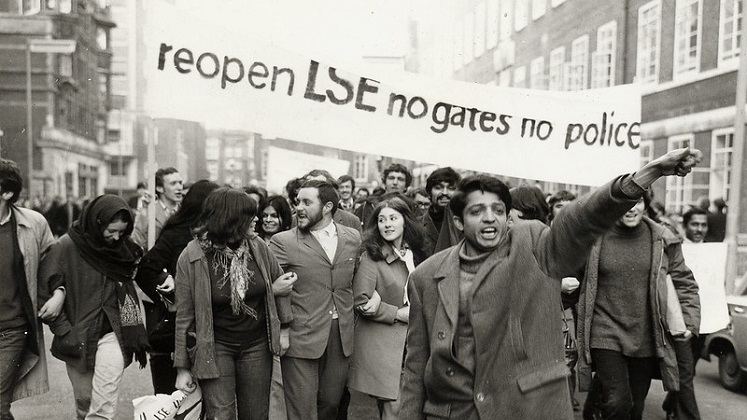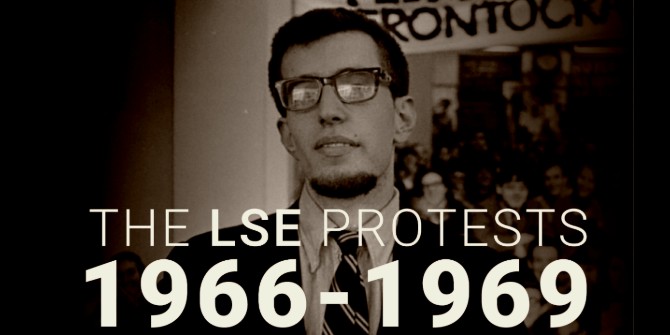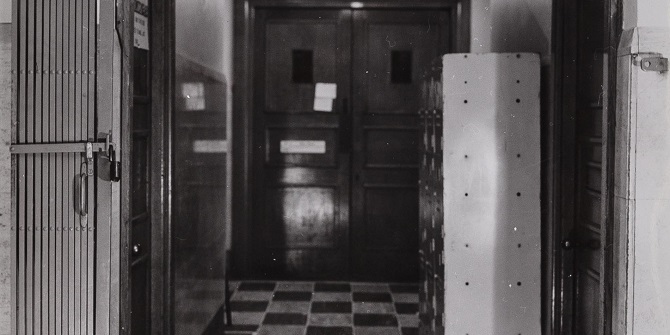Tony (BSc Sociology 1968) and Phoebe Hall (BSc Sociology 1968) tell the story of how they met while LSE students, amid the exciting atmosphere of 1960s LSE.
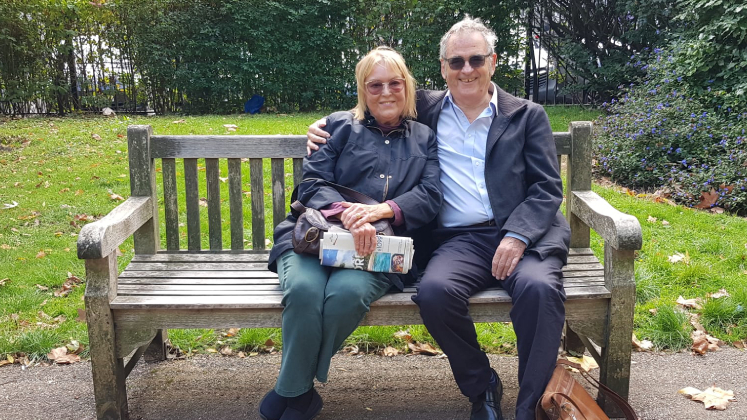
I owe everything that happened to me after October 1965 to LSE. It shaped my world view, it found me my life partner. – Tony Hall
LSE in the mid-sixties was huge, anomic and exciting. The place buzzed with ideas and an underlying foment. – Phoebe Hall
What brought you both to LSE?
Tony: At school, I had the idea that a career as a probation officer would be a good plan and a sociology course at LSE was the best place to start. My first A-level results were not good enough though, so I resat and achieved far better results three months later. At my second interview I was told that a new course was being established in social administration. This seemed more in line with my intended career path, and I was duly accepted onto the small new course, arriving at LSE in October 1965. This was a chance event that shaped the rest of my life.
Phoebe: I went to LSE because of an interest in improving the quality of care services. My father was a GP and one of my brothers had a learning disability. The interview, which I dreaded, was intimidating. Brian Abel-Smith, an advisor to the Department of Health, had just joined LSE and was part of the panel. Leaning back lazily in his chair he asked me to tell him something he didn’t know about general practice. I went for broke and asked him whether he was aware of the Temporary Residents forms GPs used to claim remuneration when visitors to the locality needed an emergency appointment. These were stacked on the reception desks of local hotels where residents would be encouraged to fill them out, in case they needed care. I was offered a place!
How did you first meet?
Phoebe: Tony and I were in the first intake of the new social administration course. We met in seminars, lectures, Florrie’s Coffee Bar and Wright’s Bar. By the second term we were an item!
Tony: Immediately after graduating, in the summer of 1968, we sat on a bench in Lincoln’s Inn Fields and decided that now was a good time to get married. Our wedding was just a few months later, in the snow at a Register Office in Ipswich, on 28 December 1968, surrounded by our families and closest friends.
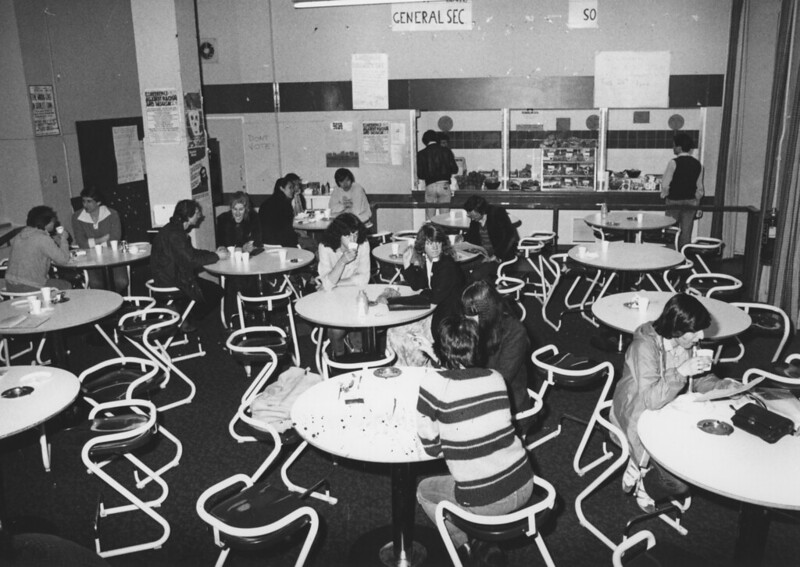
What was it like at LSE during the late ’60s?
Tony: LSE in the mid-1960s was at the centre of the world. Labour was in power and most of our tutors were advising the government which fed directly into our studies. Fleet Street, home to all the national newspapers at the time, was on our doorstep and the link between politics and the media was evident every day.
Within five weeks of starting at the School, the Rhodesian Government declared independence which prompted our first demonstration march down the Strand to Rhodesia House. In our second year, two students were sacked by the School for publicly challenging the appointment of Walter Adams as the next LSE Director because of his alleged links to the Rhodesian regime, and we were involved in the first sit-in in Britain. Eight days listening to speeches in the Old Theatre, watching the press coverage and observing the political machinations within the School to resolve matters was almost as valuable as the impressive teaching programme provided.
Phoebe: LSE in the mid-sixties was huge, anomic and exciting. The place buzzed with ideas and an underlying foment. Any issue could cause the students to “kick off”, which we did! What made the academic environment so special was the acknowledged pre-eminence of so many of the staff who taught us. The lawyers, historians, economists and social policy analysts were also government advisers, TV pundits, members and heads of Royal Commissions. Many were known internationally. They had their feet under the right tables and were influential and respected.
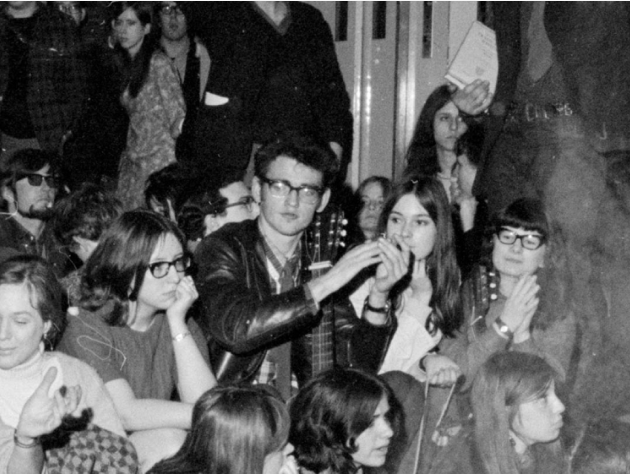
What did you do after LSE?
Phoebe: Tony registered for a PhD while I became a researcher at LSE and later at the Centre for Studies in Social Policy. After ten years of research and teaching (with four publications, many articles and book reviews) I joined the Department of Health’s Social Services Inspectorate. I managed a policy team covering southern England at a time when the number of Social Services Departments increased following the introduction of unitary authorities. Funding for care was tight but much easier than today. We combined work in high pressure jobs with the joys of two lovely children, who now have children of their own.
Tony: I did not enjoy the PhD experience of working on my own so, instead of submitting my research for my doctorate, I published it as a book. On the strength of this I was offered the post of Lecturer in Management and Organisation Studies at the National Institute for Social Work Training. I then moved onto the University of Bristol where I was a lecturer in Social Policy for five years, after which I became Director of the Association of British Adoption and Fostering Agencies. My last role was as the Director of the Central Council for Education and Training in Social Work, which I took in 1986. After managing social work training during ten difficult years of the unsympathetic Thatcher administration, I took early retirement in 1997.
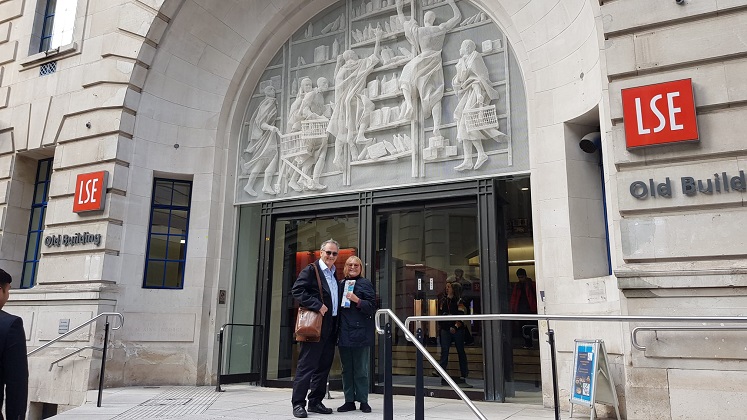
What advice do you have for today’s LSE couples?
Phoebe: For the LSE couples of today, I can only say that if you transition into adulthood with someone you love and who shares your world view, hang on to them. Friends you make at LSE can be friends for life.
Tony: Arguably, I owe everything that happened to me after October 1965 to LSE. It shaped my world view, it found me my life partner, and by sheer chance of timing it introduced me to social policy rather than the world of Durkheim and Weber which I would have hated! Enjoy your LSE experience and make the most of all the opportunities the School has to offer, in other subjects as well as your own. Make friends and keep them.
This post originally appeared on the LSE alumni profiles webpages


